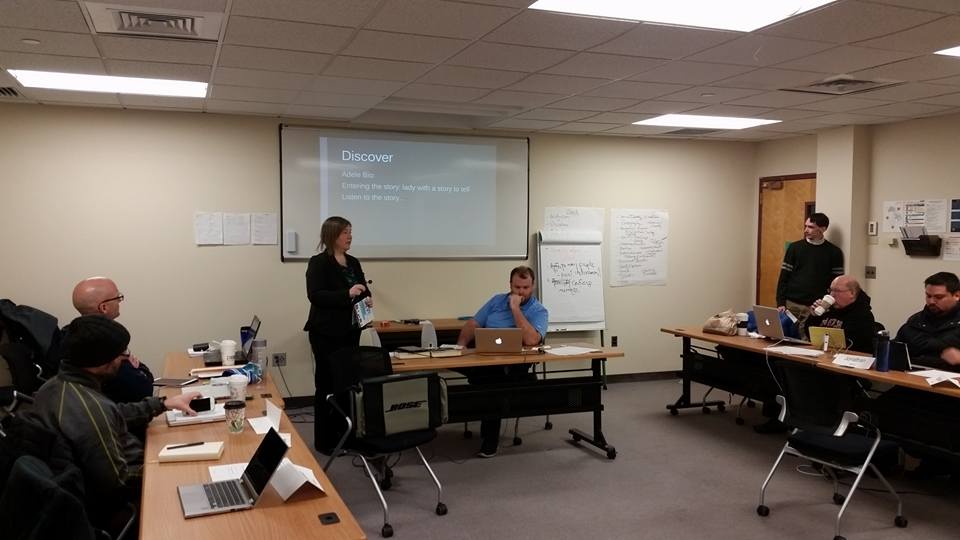For the past two weeks I’ve been spending concentrated time discussing things that matter with people who know these things matter. Once again, I was on the campus of Gordon-Conwell Theological Seminary (a very special place to me!) where I teach and mentor doctoral students alongside my good buddies Duffy Robbins and Adonis Vidu. Gathered with us in the room was a diverse group of highly motivated and incredibly insightful students who are pursuing a Doctor of Ministry degree in Ministry to the Emerging Generations. We get them for three years (two weeks a year) in the classroom, and then we have the joy of mentoring them through the writing process.

This year we gathered for a two-week residency where we talked about nothing but culture. . . what it is, how it functions, why it matters, and how to engage and use it as followers of Jesus Christ. It was awesome! Our time concluded with a morning full of insightful cultural exegesis presentations on current music videos. . . Adele’s “Hello,” Demi Lovato’s “Cool for the Summer,” The Weekend’s “In The Night,” and Twenty One Pilots’ “Stressed Out.” Can’t wait to be with these folks at Gordon-Conwell again next January!
One of our students, Brian Barry, is an Anglican rector who is working with kids and families. While he was on campus with us at Gordon-Conwell, he sent out these words to his congregation, telling them what it was he was doing while at GCTS. . .
When I studied at Gordon-Conwell several years ago in preparation for ordination, one of the major emphases of the program was on developing tools for “exegesis,” that is, learning to interpret the Scriptures. This involved learning the original language, the cultural background, the general themes and overview of the Bible. It also involved being familiar with how different Christians have interpreted the God’s Word throughout history.
I am back at Gordon-Conwell, beginning the second year of the Doctor of Ministry program. A dozen students from around the world who work with children, youth, and young adults have gathered for two weeks. Again, the bulk of our time is being spent developing tools for exegesis. One twist; this time, we are focused on “cultural exegesis.” Those of us working among the young are observing such a rapid rate of change that we need to approach contemporary culture like archaeologists, examining and understanding “artifacts” from our own culture. These artifacts include movies, magazines, music, advertisements.
Why go to this trouble?
First of all, closely examining our own culture helps us to understand the “soup that we are swimming in,” as one of our professors has put it. The Church doesn’t live in a vacuum; our culture has a deep impact upon us, whether we are willing to admit it or not. If we examine those cultural influences carefully, it gives us the opportunity to think about them in light of God’s Word and honestly ask difficult questions about how we are and are not being faithful to that Word.
Second, we do “cultural exegesis” so that we can speak the Word of God more clearly in this time and place. Cultural “artifacts” place us in the middle of a conversation that is already taking place. This conversation addresses many questions: What does it mean to be human? What is right, good and beautiful? What ultimately matters? How we respond to the pain we face? God’s Word has a place in this conversation, and it certainly helps to know what questions are being asked and what answers are being suggested before attempting to speak that Word clearly here and now.
Teen movies, popular magazines, music videos and the like are, as you may guess, not exactly my everyday “cup of tea.” These artifacts are, in fact, quite foreign. But whether I enjoy them is not the question. Rather, it is this: can I approach that which is foreign to me with an open and loving heart, desiring not to criticize, but to truly know my neighbor? Can we speak God’s Word so clearly it can actually be understood, believed, and obeyed here and now? We have been celebrating Jesus’ Incarnation; he entered our world out of love for us— will we follow in his steps?
I love Brian’s thoughtful summary of what it is we endeavor to do together in our Doctor of Ministry in Ministry to the Emerging Generations program at Gordon-Conwell.
So much good thought-time among many bright Christians is being invested into knowing, answering, and creating culture. One of those thinkers I’ve come to love is Tim Keller. Here’s a short video of Keller explaining why culture matters to an audience gathered at the Q conference. This is well worth your time. . .
While the bad news is that this DMin cohort will gather together for the last time next January, the good news is that anyone interested in joining a brand new cohort that begins in June 2017 can get the admission process rolling now. If you’re interested, get in touch with myself, Duffy Robbins, or Adonis Vidu. It’s a rich and rewarding time of ministry preparation and learning together about stuff that really does matter.